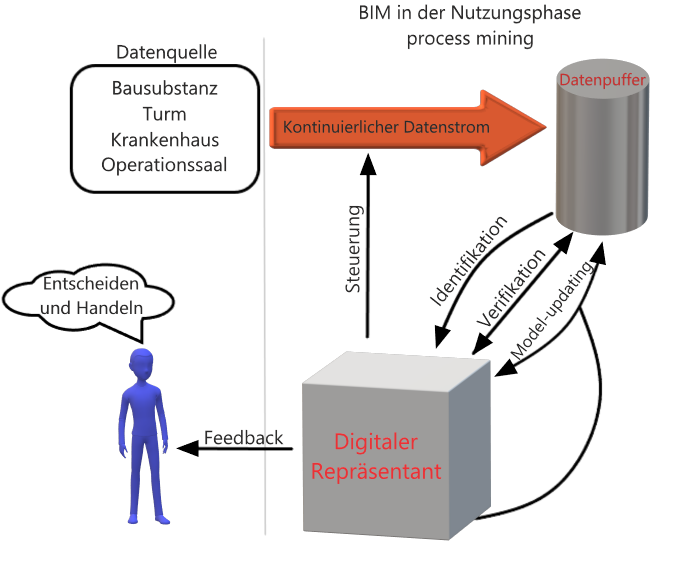Development of a demonstrator - ‘The digital representative’ - for use in the process-oriented utilisation phase of building information modelling (BIM)
Motivation
The digital transformation is bringing about far-reaching changes in all areas of society. Likewise, all areas of industry, but also all infrastructures, are undergoing change due to the possibilities of the digital age. Examples include: ‘Industry 4.0’ - the comprehensive digitalisation of industrial production -, ‘Smart Cities’ - the networked city of the future - and ‘Building Information Modelling’ (BIM) - the optimised planning, execution and management of plants, buildings and infrastructures.
In the life cycle of exposed technical structures in engineering, condition analysis is mandatory in order to realise function and safety in operation. The ‘BIM methods’ are currently focussed on the planning and execution phases. The actual benefits of digitalisation can be expected in the utilisation phase or the management phase. This raises the question of how digitalisation can take place in this third phase, in particular in order to integrate a sustainable and resource-saving condition analysis into the BIM process. The overall aim is to create a demonstrator.
In this context, different infrastructure processes in particular are to be taken into account. The approach and the associated digitalisation will be very general in terms of methodology and information technology in order to ensure a desirable wide range of transferability. The realisation should be based on process data to be recorded and evaluated in a model-oriented manner. The focus is on the broad applicability of this methodology, which will range from typical large infrastructures of exposed special structures - e.g. bridges and towers - to specialised and special areas of clinics and medical technology in the healthcare sector - e.g. the management of clinics and operating theatres in surgery. Close cooperation between the partners a) the Interdisciplinary Centre for Computer-Assisted Surgery (ICCAS) Prof. Neumuth and b) the HTWK-Leipzig Prof. Lenzen is therefore necessary.
Intelligent systems and methods for analysis are essential in order to derive benefits from the flow of data and information; an additional advantage here can be a real-time capability to be defined. Conventional analysis methods mainly work statically; the data is first saved and then fed to an analysis step. This approach is not target-oriented in the context of digitalisation in the BIM usage phase due to the data flow. What is required is a process-orientated and real-time-oriented analysis of the data with the aim of reducing it to relevant and significant information.
Objectives of the research project
The methods will first be developed theoretically and implemented in algorithms. Validation takes place on three levels: Laboratory experiment, pilot plant scale and real large-scale structure. For this purpose, the modular experimental fields (laboratory/free field Nieperbau) of the HTWK Leipzig will be used as central structures for generating the data flow.
The core topic of the doctoral project is visualised under the term process mining. The chain from data generation to feedback communication with the expert is to be analysed. Methods of modelling, real-time data processing as well as process and data analysis based on linear algebra and stochastics will be investigated and a prototype will be created. A systematic representation of process mining with derived project objectives is outlined in Figure 1.
Publications
Conference papers and scientific presentations
- An in situ experimental setup for damage localization and mechanical parameter estimation; M. Vollmering, I. Dolbonosov, A. Lenzen; Eurodyn 2020 - XI International Conference on Structural Dynamics, 2020.
- Theorie und Praxis der Schätztheorie zur Identifikation mechanischer Parameter in der Strukturdynamik; I. Dolbonosov; D-A-CH-Doktorantenkolloquium der DGEB (Deutsche Gesellschaft für Erdbebeningenieurwesen und Baudynamik e.V.); 2019; Weimar.

